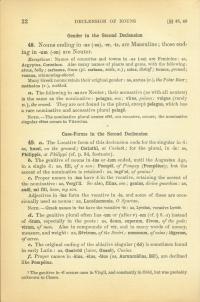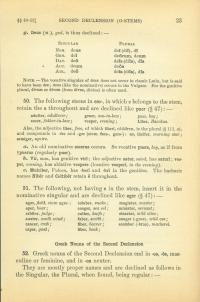49.a. The locative form of this declension ends for the singular in -ī.
humī on the ground
Corinthī at Corinth
For the plural, in -īs.
Philippīs at Philippi (cf. § 80, footnote)
b. The genitive of nouns in -ius or -ium ended, until the Augustan Age, in a single -ī;
fīlī of a son
Pompêī of Pompey (Pompêius)
but the accent of the Nominative is retained.
ingĕ'nī of genius1
c. Proper names in -ius have -ī in the Vocative, retaining the accent of the Nominative.
Vergĭ'lī
So also, fīlius (son); genius (divine guardian).
Audī, mī fīlī. Hear, my son.
Adjectives in -ĭus form the Vocative in -ie, and some of these are occasionally used as nouns.
Lacedaemonie O Spartan
Note— Greek names in -īus have the vocative -īe.
Lyrcīus; voc. Lyrcīe
d. The genitive plural often has -um or (after v) -om (cf. § 6.a) instead of -ōrum, especially in the poets:
deum, superum, dīvom of the gods
virum of men
also in compounds of vir, and in many words of money, measure, and weight.
Sēvirum of the Seviri
nummum of coins
iūgerum of acres
e. The original ending of the Ablative singular (-ōd) is sometimes found in early Latin.
Gnaivōd (later, Gnaeō), Cneius
f. Proper names in -âius, êius, -ôius (as, Aurunculêius, Bôī), are declined like Pompêius.
g. Deus [(m.), god] is thus declined.
Note— The vocative singular of deus does not occur in classic Latin, but is said to have been dee; deus (like the nominative) occurs in the Vulgate. For the genitive plural, dīvum or dīvom (from dīvus, divine) is often used.

![Declension of masculine noun Deus [god]](/sites/default/files/deus_decl_0.jpg)

